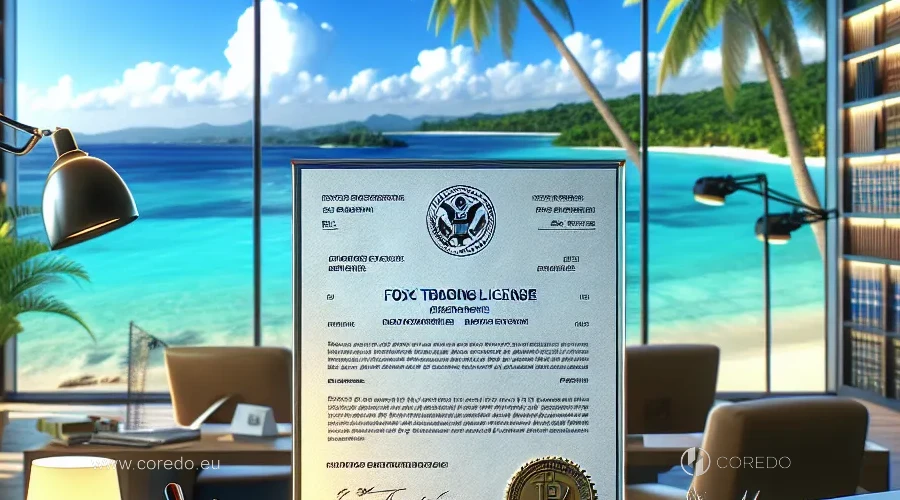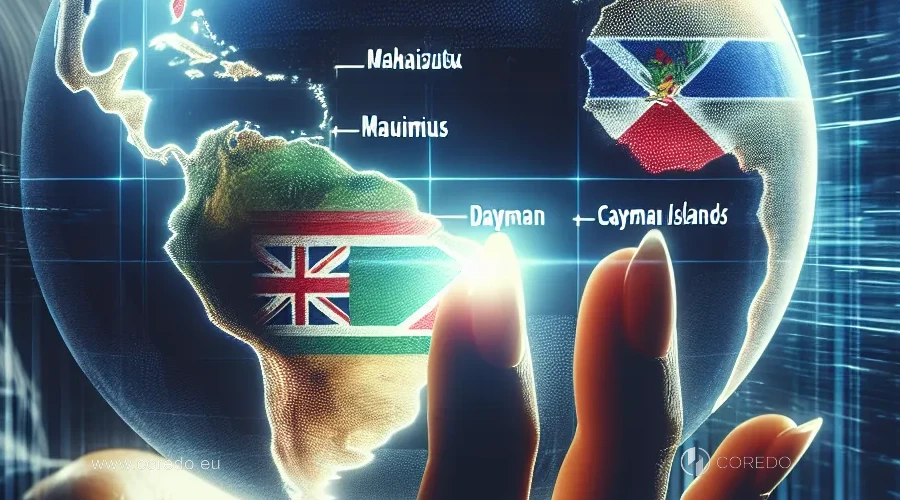In 2024, the global forex market surpassed $2.5 quadrillion in daily turnover, with the Caribbean region becoming one of the most discussed destinations for licensing brokerage companies. However, behind the “business on the beach” facade lie not only opportunities but also potential pitfalls: from tightening global AML requirements to banking service challenges and reputational risks. Why are more entrepreneurs from Europe, Asia, and the CIS choosing the Dominican Republic to open a forex company today? How to minimize risks and ensure long-term legalization of forex activities in the Caribbean?
In this article, I, Nikita Veremeev, founder of COREDO, will share the practical experience of a team that has implemented dozens of projects to register forex brokers in the Dominican Republic, the EU, Asia, and other key markets in recent years. We will examine the real advantages and limitations of a Dominican forex broker license, compare jurisdictions, review FSU regulator requirements, and provide step-by-step instructions and strategic recommendations for international brokers. If you are looking for more than just another overview, but a practical guide to opening a forex company in the Dominican Republic with compliance nuances, risks, and scaling prospects in mind, I recommend reading to the end.
Forex License in the Dominican Republic – Pros and Nuances

Forex license in the Dominican Republic is a sought-after tool for companies that want to officially operate in the global financial markets. Obtaining such a license offers several benefits but also involves nuances related to capital requirements, corporate structure, and regulatory procedures. More about the licensing process for forex companies in the Dominican Republic: in the following sections.
In the next section, we will take a detailed look at the stages of obtaining and licensing features of forex companies in the Dominican Republic.
Licensing Forex Companies in the Dominican Republic
The Dominican Republic has long established itself as one of the most flexible and pragmatic jurisdictions for international forex brokers. Among the key advantages are relatively quick licensing times (from 3 to 6 months), moderate minimum capital requirements, and a lenient policy by the FSU regulator towards non-residents.
Compared to Mauritius and the Cayman Islands, the Dominican Republic offers a more balanced ratio between licensing costs, capital structure requirements, and the level of regulatory oversight.
The reputation of the Dominican license in international markets is gradually strengthening, as evidenced by an increasing number of requests to register forex brokers in this jurisdiction.
Risks of a Forex License in the Dominican Republic
On the other hand, the advantages of the Dominican Republic do not negate several strategic risks. Firstly, the level of regulatory oversight by the FSU is lower than that of European and some Asian regulators, which might affect large institutional investors’ perception of the license. Secondly, changes in legislation and international regulations (such as tightening of AML/KYC requirements) could necessitate prompt adaptation of internal policies and procedures.
Forex License in the Dominican Republic: FSU Requirements

The forex license in the Dominican Republic is issued by a special regulator: the FSU, and it entails compliance with various formal and financial requirements. To successfully obtain a license, you need not only the minimum capital but also compliance with the structure, business transparency, and control systems established by FSU rules. Below we will review the key requirements, starting with the minimum capital and its structure.
Minimum Capital and Its Structure
The FSU regulator sets minimum capital requirements for forex brokers, typically ranging from $100,000 to $250,000, depending on the license type and intended operation volume. It is important that the capital be supported not only by documentation but also be factually located in the company’s accounts within a licensed financial organization in the Dominican Republic.
AML/KYC for Forex Brokers in the Dominican Republic
Implementing effective KYC procedures and internal control is a key element in meeting FSU requirements. The regulator requires an independent compliance officer responsible for developing and implementing AML internal policies, conducting regular Due Diligence of clients, and monitoring transactions.
This not only reduces regulatory risks but also increases trust from banks and partners.
Operational Infrastructure and Control
The operational expenses of a forex broker in the Dominican Republic include licensing costs and expenses for maintaining infrastructure: IT platforms, internal audit, legal support, and regular reporting to the FSU.
Hence, a systematic approach to expense management becomes an important competitive advantage, especially during the Forex licensing phase in the Dominican Republic.
Forex License in the Dominican Republic – How to Obtain

Forex license in the Dominican Republic, how to obtain it: the process involves not only meeting formal requirements but also careful documentation preparation, among which the business plan is considered key. The preparation of the correct document submission has a significant impact on the chances of successfully obtaining the permit and provides access to work in international markets.
Business Plan for the License: How to Prepare Documents
The first stage, developing a detailed business plan for the Forex license in the Dominican Republic. The document should reflect the company’s structure, target markets, financial model, risk management strategy, AML/KYC policy, and description of IT infrastructure. Key documents for registering a Forex broker include:
- Incorporation documents and charter
- Confirmation of minimum capital
- Information about beneficiaries, directors, and shareholders
- AML/KYC policies and procedures
- Agreements with technology and banking providers
Submitting the Application to the Regulator – Stages
After preparing the documents, the application is submitted to the FSU via an electronic platform. In practice, the process includes several stages:
- Preliminary document package audit
- Application submission and payment of state fees
- Due Diligence of shareholders and directors
- Business plan and compliance program assessment
- Preliminary approval and opening of a corporate account
- Final approval and license issuance
Realistic license obtaining timelines: from 3 to 6 months, provided full compliance with requirements and no remarks from the FSU.
Legal Support for Forex in the Dominican Republic
Legal support at each stage is the key to successful licensing. Solutions developed at COREDO include not only document preparation but also strategic consulting on corporate governance, tax residence, holding structure, and SPV.
Where to Open a Forex Company: Dominican Republic, Mauritius, Cayman Islands

Before choosing where to open a forex company, whether in the Dominican Republic, Mauritius, or the Cayman Islands, it is important to understand the specifics and advantages of each of these jurisdictions. Below is a comparison of key parameters to help evaluate the conditions and requirements for conducting forex business in each of these regions.
Comparison of Jurisdiction Parameters
| Parameter | Dominican Republic | Mauritius | Cayman Islands |
|---|---|---|---|
| Minimum Capital | $100,000 | $250,000 | $500,000 |
| Licensing Timeframe | 3-6 months | 4-8 months | 6-12 months |
| License Cost | $35,000+ | $45,000+ | $70,000+ |
| Reputation | Medium/High | High | Very High |
| AML/KYC Requirements | Medium | Strict | Very Strict |
| Banking Account Challenges | Medium | Low | High |
| Scalability | High | Medium | High |
How to Choose a Jurisdiction for Forex Business
The choice of jurisdiction depends on strategic goals, target markets, budget, and readiness to invest in compliance. COREDO’s practice confirms:
Mauritius and the Cayman Islands are suitable for those betting on the highest reputation and working with institutional clients but ready for higher costs and banking service complexities.
Profitability and Cost of a Forex License in the Dominican Republic

Profitability and the cost of a forex license in the Dominican Republic depend directly on both initial investments and ongoing operational expenses. Understanding the structure of direct and indirect costs when obtaining and maintaining a license allows for an objective assessment of the overall economic efficiency of operating in this market.
Direct and Indirect Costs for Licenses and Operations
Key expense items:
- State fees and license payments ($35,000–$50,000)
- Minimum capital ($100,000+)
- Legal and consulting costs ($20,000–$40,000)
- Operational expenses (IT, compliance, audit, banking services, $5,000–$10,000/month)
- Banking service complexities: account opening takes 1 to 3 months, requiring an extensive compliance package
How to Calculate Forex License ROI?
ROI evaluation is based on analyzing potential revenue, operational expenses, and the cost of attracting clients in target markets. Calculations use:
- Forecasted turnover and margin
- Compliance and IT expense dynamics
- Assessment of license ownership cost for 3–5 years
In several COREDO cases, the return on investment in licensing in the Dominican Republic is achieved within 12–18 months with a competent scaling strategy and internal process optimization.
Growth of Forex Business with a Dominican License
The growth of forex business with a Dominican license is driven by easy permit acquisition, flexible regulator requirements, and the ability to quickly enter the international market. Effective automation of compliance procedures using modern technologies and solutions plays a significant role in the successful development of companies here.
Compliance Automation: Technologies and Solutions
Implementing modern IT platforms for KYC automation and transaction monitoring: a mandatory condition for long-term compliance with FSU and international standards. The COREDO team integrates solutions that reduce staff workload, improve Due Diligence quality, and respond promptly to regulatory changes.
Forex Market in the Dominican Republic and the Caribbean
Latin America shows a steady increase in demand for online trading and financial services. The Dominican Republic is becoming a gateway not only to Caribbean markets but also to Central and South America.
License Liquidation and Jurisdiction Change
License liquidation and jurisdiction change are stages requiring a comprehensive approach when terminating business activities in one country and the need to move to another jurisdiction. In this section, we’ll look at how to liquidate a license, close a business, and what decisions need to be made when switching the country of business registration.
How to Liquidate a License and Close a Business
Liquidating a forex broker license in the Dominican Republic includes:
- Notifying the FSU and clients of business cessation
- Settling liabilities with counterparties and employees
- Closing corporate accounts and filing reports
- Legal processing of company liquidation
Minimizing Risks When Changing Jurisdictions
Changing a jurisdiction requires strategic planning: tax consequence analysis, notifying regulators, adjusting corporate structure, and transferring IT infrastructure.
Practical Tips for Entrepreneurs
Opening a forex company in the Dominican Republic: it’s not just about registering an offshore structure but a complex project requiring strategic planning, a deep understanding of regulatory requirements, and effective risk management. For a successful launch and scaling, I recommend adhering to the following algorithm:
Actionable steps:
- Conduct a comparative analysis of jurisdictions considering your goals and budget.
- Develop a detailed business plan and prepare a document package that aligns with FSU requirements.
- Implement modern IT solutions for compliance automation and risk management.
- Ensure transparency of capital and beneficial ownership structure.
- Establish AML/KYC internal policies and appoint an experienced compliance officer.
- Plan a budget considering all direct and indirect expenses.
- Build an internal control and corporate governance system.
- Prepare a scaling and exit strategy (liquidation, jurisdiction change).
Checklist for choosing jurisdiction and partner:
- Jurisdiction and regulator reputation
- Level and cost of compliance
- Banking service complexities
- Scalability and access to new markets
- Experience and expertise of legal and consulting partners
Recommendations for risk and compliance management:
- Regularly update internal policies according to legislative changes
- Conduct staff training on AML/KYC and internal control
- Collaborate with international auditors and consultants
- Assess reputational risks when choosing an offshore license